Ne tente jamais de comprendre comment deux personnes sont apparentées dans une famille arabe, à moins d’être prêt à écouter une longue et détaillée leçon de généalogie qui s’étend sur plusieurs générations et inclut au moins trois cousins. Un simple « oncle » ou « cousin » ne suffit jamais – chaque réponse s'accompagne d’un résumé de l’histoire familiale et, une fois terminé, tu pourrais même oublier pourquoi tu avais posé la question. 😅
Dans la culture arabe, la famille ne se limite pas aux proches parents ; c’est un vaste réseau interconnecté où tout le monde semble se connaître – ou du moins le prétend. 🙂 Les liens familiaux ne sont pas seulement biologiques ; ils forment une structure sociale qui influence les relations et les interactions. Il est important de savoir si une personne est liée par le côté maternel ou paternel, si elle est plus âgée ou plus jeune, et cela se reflète dans les termes précis utilisés pour s’adresser à elle. Par exemple, les termes pour "oncle" et "tante" sont bien plus spécifiques qu’ils ne le sont dans de nombreuses autres langues, variant selon le côté de la famille et leur position dans la hiérarchie familiale. Le respect des aînés est particulièrement important, c’est pourquoi un frère cadet peut même être appelé "Petit Père" (Abu X), tandis qu’un frère ou une sœur aîné(e) peut recevoir un titre symbolisant l’honneur et le statut.
Si tu veux apprendre maman en arabe et papa en arabe, mieux vaut commencer par les bases. Maman en arabe est أم (Umm), tandis que papa en arabe est أب (Ab). À partir de là, tout un système se déploie, où chaque membre de la famille possède un nom spécifique selon sa place exacte dans la hiérarchie familiale. Si tu es curieux de savoir comment les Arabes désignent leurs proches – et que tu veux éviter d’appeler accidentellement un inconnu “oncle” – continue à lire ! 😃
If you want to deepen your knowledge of Arabic, try the PixiLearn Arabic learning app, where you can learn Arabic words and phrases in a fun and interactive way. Download it now and start learning! Learn Arabic words with PixiLearn
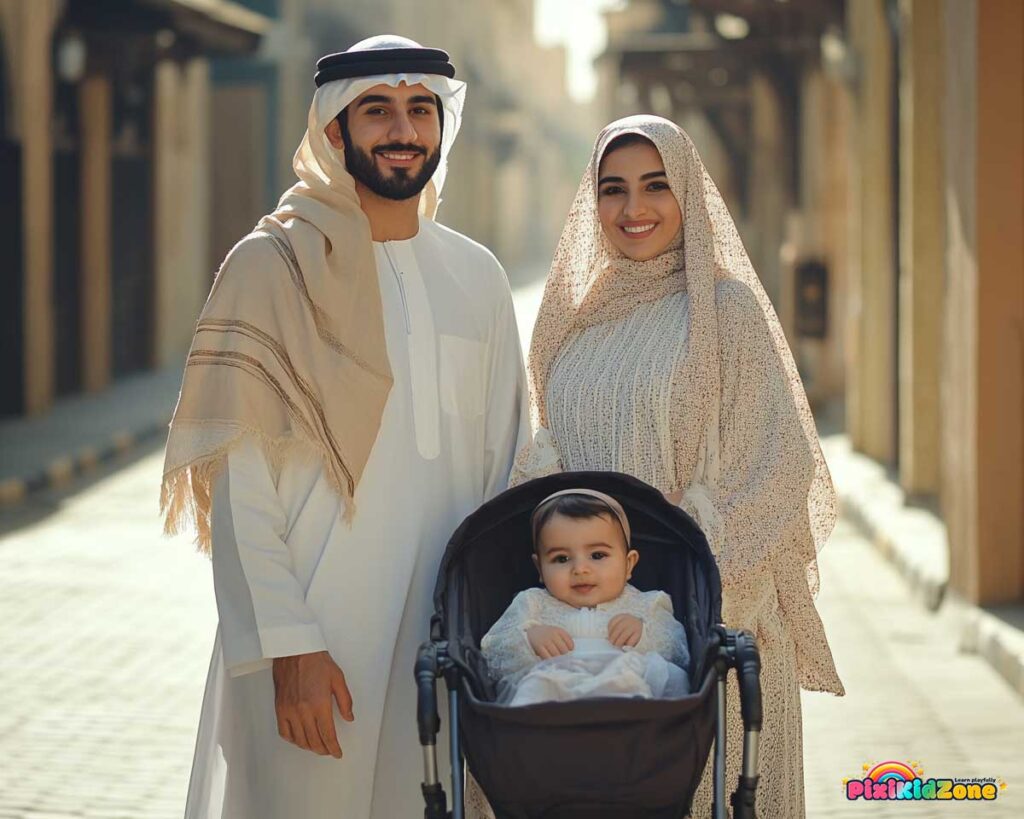
Maman en arabe et Papa en arabe
Maman en arabe – أم (Umm)
En arabe, le mot pour maman est أم (Umm), prononcé “Omm”.
Les mères occupent un rôle central dans la culture arabe, étant souvent considérées comme le cœur de la famille. La langue arabe reflète ce profond respect à travers des titres affectueux comme “Umm + prénom de l’aîné”, où une mère est parfois appelée par le nom de son premier enfant, comme Umm Ahmed (mère d’Ahmed).
Papa en arabe – أب (Ab)
Le mot arabe pour papa est أب (Ab), prononcé “Ab”.
Dans la culture arabe, les pères sont traditionnellement considérés comme le chef de famille, responsables de l’orientation et du soutien. Comme les mères, les pères reçoivent également des titres honorifiques, généralement “Abu + prénom de l’aîné”, comme Abu Khalid (père de Khalid), symbolisant leur rôle et statut au sein de la famille.
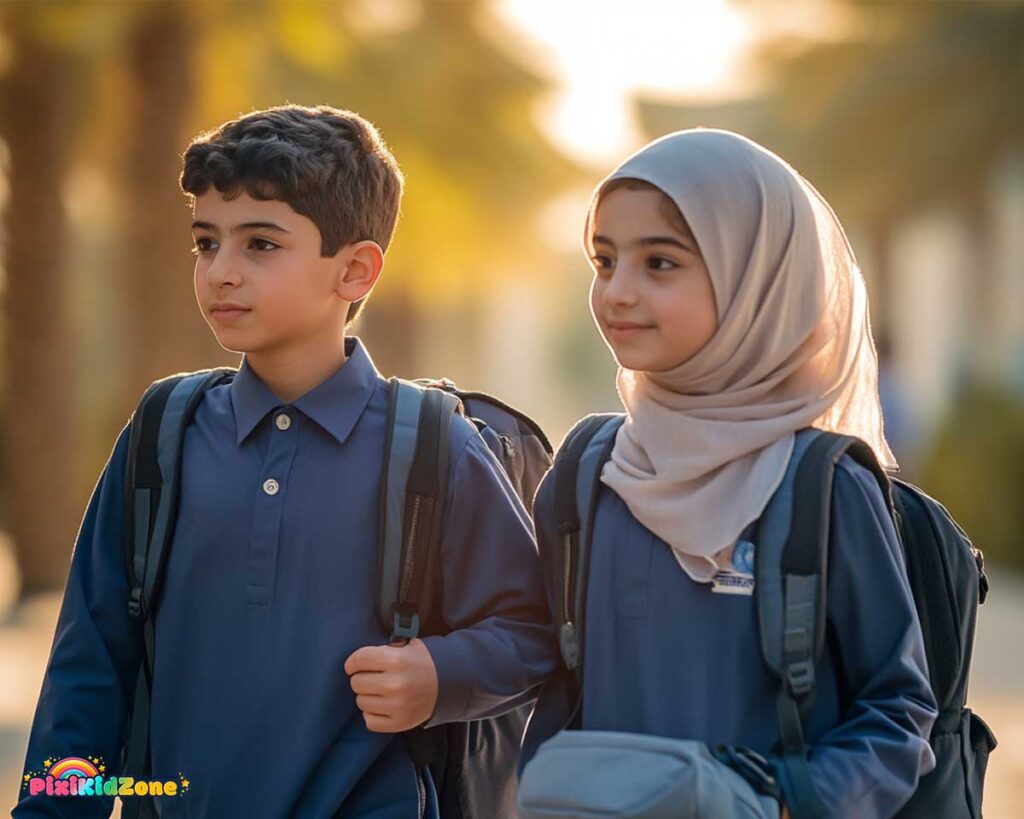
Fils en arabe et Fille en arabe
Fils en arabe – ابن (Ibn)
En arabe, le mot pour fils est ابن (Ibn), prononcé “Ibn” ou “Bin” dans certains dialectes.
Le terme Ibn n'est pas seulement utilisé dans les conversations familiales quotidiennes, mais apparaît également dans des contextes historiques et formels, comme dans les noms (par exemple, Ibn Sina, signifiant Fils de Sina). Dans la société arabe traditionnelle, les fils sont souvent considérés comme les porteurs du nom et de l'héritage familial.
Fille en arabe – بنت (Bint)
Le mot arabe pour fille est بنت (Bint), prononcé “Bint”.
Contrairement à Ibn, souvent utilisé dans les noms complets, Bint apparaît dans les références généalogiques, comme “Bint Ali”, qui signifie Fille d'Ali. Historiquement, ce terme était employé dans les familles nobles pour mettre en avant l’ascendance. Dans de nombreux foyers arabes, les filles occupent une place précieuse et reçoivent souvent des surnoms affectueux.
Arabic Word for Brother and Sister
Brother in Arabic – أخ (Akh)
In Arabic, the word for brother is أخ (Akh), pronounced as “Akh” (with a soft “kh” sound, like the German “Bach”).
In Arab culture, the bond between siblings is highly valued. An older brother (Akh Kabeer – أخ كبير) often takes on a protective and guiding role within the family, while younger brothers (Akh Sagheer – أخ صغير) are expected to show respect and follow their elders’ advice.
Sister in Arabic – أخت (Ukht)
The Arabic word for sister is أخت (Ukht), pronounced as “Ukht”.
Sisters hold a special place in Arab families, often taking on nurturing roles. An older sister (Ukht Kabeera – أخت كبيرة) is traditionally viewed as a second mother, offering guidance and care, while younger sisters (Ukht Sagheera – أخت صغيرة) are usually pampered and protected by their siblings.
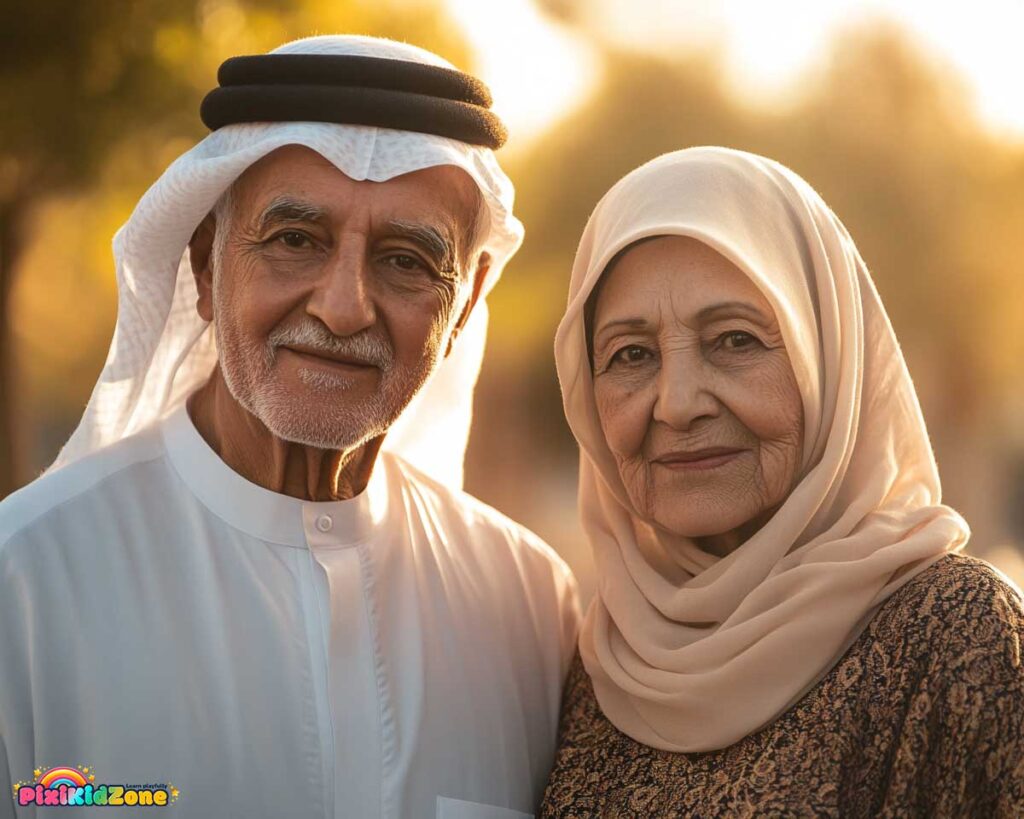
Arabic Word for Grandfather and Grandmother
Grandfather in Arabic – جد (Jadd)
In Arabic, the word for grandfather is جد (Jadd), pronounced as “Jadd”.
Grandfathers are highly respected in Arab families, often seen as the family’s wisdom keepers. They play an important role in passing down traditions, stories, and values. In some regions, affectionate terms like “Jiddi” (جدي) or “Sidi” (سيدي) are used to address grandfathers, reflecting deep respect and closeness.
Grandmother in Arabic – جدة (Jadda)
The Arabic word for grandmother is جدة (Jadda), pronounced as “Jadda”.
Grandmothers are often the heart of the household, known for their hospitality and love, especially when it comes to cooking! In some dialects, grandmothers are lovingly called “Teta” (تيتا) or “Jiddati” (جدتي). Their role extends beyond the family, as they often serve as the unifying force keeping multiple generations connected.
Arabic Word for Uncle and Aunt
Uncle in Arabic – عم (Am) / خال (Khal)
In Arabic, there are two different words for uncle, depending on whether he is from the father’s or mother’s side:
- عم (Am) – Paternal uncle (father’s brother), pronounced as “Am”
- خال (Khal) – Maternal uncle (mother’s brother), pronounced as “Khal”
Uncles often play a significant role in Arab families, acting as second fathers. The عم (Am), being from the father’s side, is often seen as an authoritative figure, while the خال (Khal) is traditionally known for being more affectionate and easygoing.
Aunt in Arabic – عمة (Amma) / خالة (Khala)
Just like with uncles, Arabic distinguishes between aunts from the paternal and maternal sides:
- عمة (Amma) – Paternal aunt (father’s sister), pronounced as “Amma”
- خالة (Khala) – Maternal aunt (mother’s sister), pronounced as “Khala”
Aunts, especially maternal ones (Khala), often take on a nurturing and caring role in a child’s life. The “Khala” is sometimes considered a second mother, while the “Amma” can hold a more traditional role within the extended family structure.
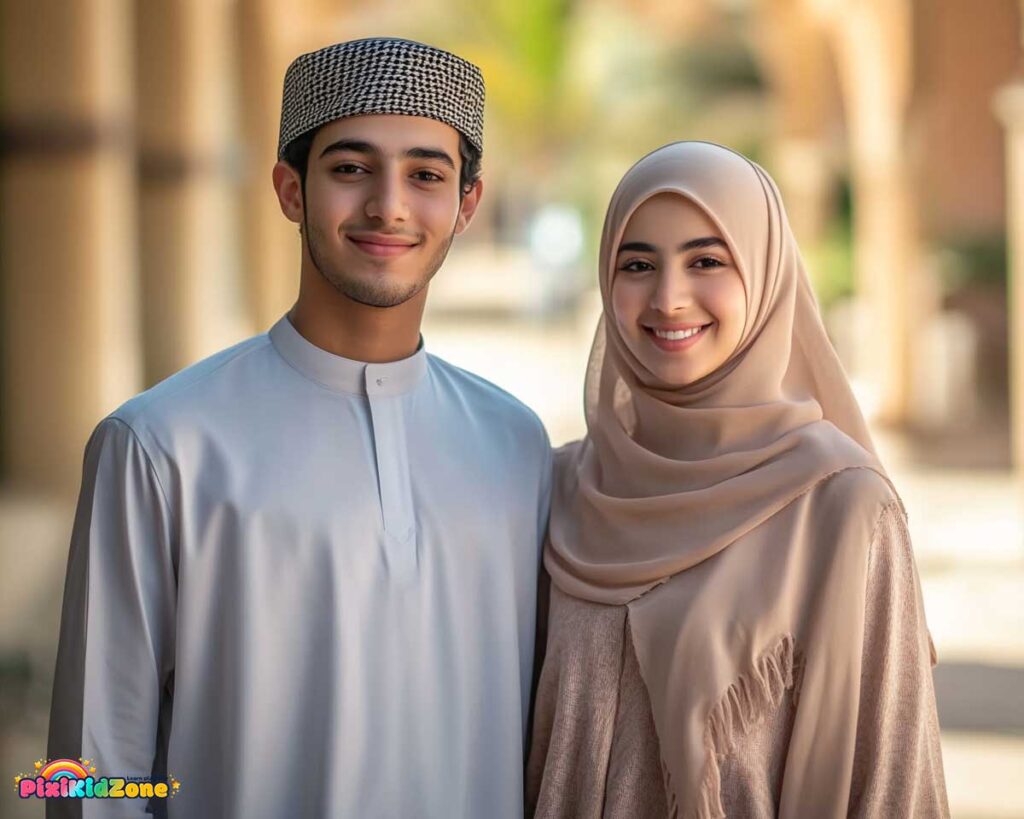
Arabic Word for Cousin (Male and Female)
Male Cousin in Arabic – ابن عم (Ibn Am) / ابن خال (Ibn Khal)
In Arabic, the word for male cousin depends on whether he is from the father’s or mother’s side:
- ابن عم (Ibn Am) – Paternal cousin (father’s brother’s son), pronounced as “Ibn Am”
- ابن خال (Ibn Khal) – Maternal cousin (mother’s brother’s son), pronounced as “Ibn Khal”
Cousins in Arab families are often as close as siblings, and in some cases, they even grow up together. Historically, in many Arab cultures, paternal cousins (especially Ibn Am) were considered potential marriage partners due to strong family ties and traditions.
Female Cousin in Arabic – بنت عم (Bint Am) / بنت خال (Bint Khal)
Similarly, the word for female cousin also changes depending on which side of the family she is from:
- بنت عم (Bint Am) – Paternal cousin (father’s brother’s daughter), pronounced as “Bint Am”
- بنت خال (Bint Khal) – Maternal cousin (mother’s brother’s daughter), pronounced as “Bint Khal”
Female cousins share a special bond in Arab families, often being treated as sisters. Just like with male cousins, Bint Am was traditionally seen as a close family connection, sometimes even a future spouse in arranged marriage traditions. However, in modern Arab society, cousin relationships are more about family unity and lifelong friendships.
Arabic Word for Grandson and Granddaughter
Grandson in Arabic – حفيد (Hafeed)
In Arabic, the word for grandson is حفيد (Hafeed), pronounced as “Hafeed”.
Grandsons hold a special place in Arab families, often being cherished and spoiled by their grandparents. In many cases, grandparents play an active role in raising and mentoring their grandsons, passing down traditions, stories, and wisdom.
Granddaughter in Arabic – حفيدة (Hafeeda)
The Arabic word for granddaughter is حفيدة (Hafeeda), pronounced as “Hafeeda”.
Granddaughters are equally adored, often receiving special attention from their grandmothers, who teach them family traditions, cooking secrets, and cultural values. In some Arab families, the first granddaughter even takes on a special role as the “little queen” of the household, bringing joy to everyone.
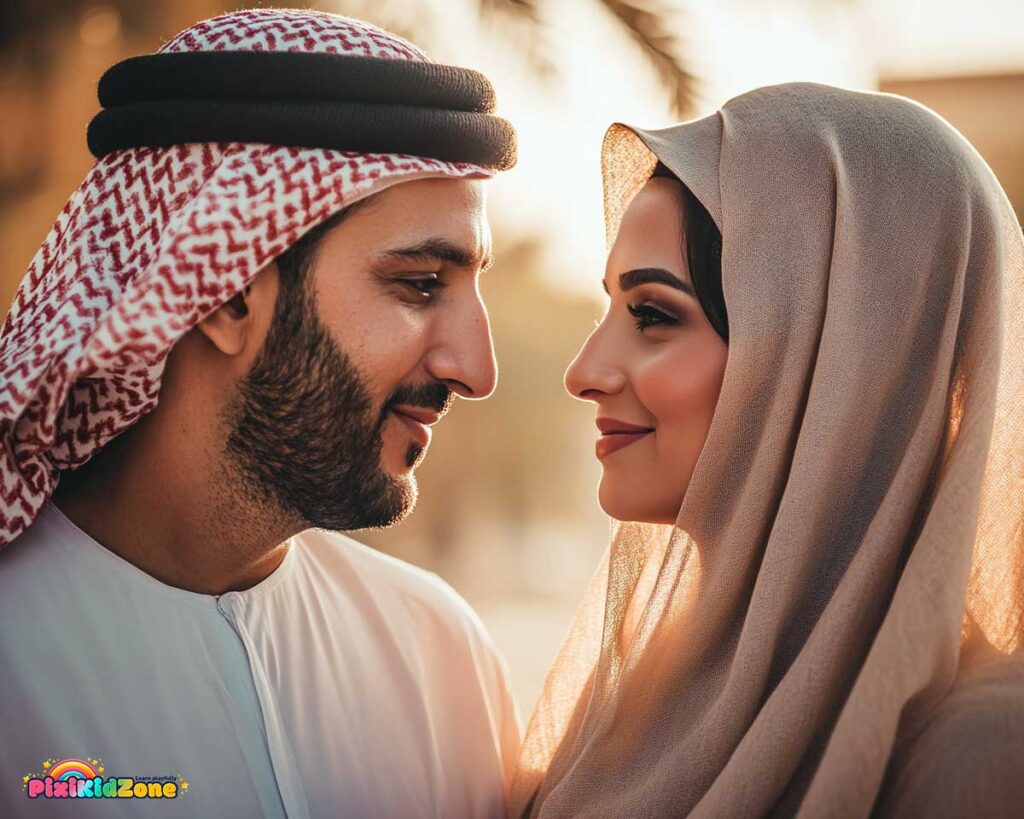
Arabic Word for Husband and Wife
Husband in Arabic – زوج (Zawj)
In Arabic, the word for husband is زوج (Zawj), pronounced as “Zawj”.
Marriage is highly valued in Arab culture, and the role of a husband extends beyond being a life partner—he is traditionally seen as the provider and protector of the family. The word “Zawj” can also mean “pair” in Arabic, emphasizing the idea of partnership and unity in marriage.
Wife in Arabic – زوجة (Zawja)
The Arabic word for wife is زوجة (Zawja), pronounced as “Zawja”.
Wives in Arab families hold an essential role, often seen as the heart of the home. In many traditional settings, the wife is responsible for maintaining family bonds, raising children, and preserving cultural traditions. The word “Zawja” comes from the same root as “Zawj”, reinforcing the idea that husband and wife are two halves of a whole.
Now You Know How to Address Someone in Arabic!
Learning Arabic family terms is not just useful for language learning—it’s a real cultural gateway. In Arab families, kinship ties mean much more than just blood relations—they shape social interactions, forms of respect, and even daily greetings.
If you ever visit an Arab family, you won’t be surprised to find that uncles and aunts have different specific titles, or that “Abu” and “Umm” (Father and Mother) are often followed by the name of their firstborn child. And if you ever ask, “How are these two related?”, you’ll quickly realize that it’s best to sit down and grab a notebook.
Now that you know the most important Arabic family words, maybe it’s time to try using them in a conversation. Who knows? The next time an Arab grandmother smiles at you, you might just know exactly how to address her. 😉
Les avez-vous déjà lus ?
Vous voulez en savoir plus sur l'arabe égyptien ? Découvrez quelle langue parlent réellement les Égyptiens ! https://pixikidzone.com/fr/blog/speak-the-egyptian-language-but-wait-what-language-do-they-actually-speak/
Curieux de savoir comment demander « Comment ça va ? » en arabe ? Apprenez les formules les plus polies ! https://pixikidzone.com/fr/blog/arabic-for-how-are-you-learn-how-to-ask-politely/
Vous êtes-vous déjà demandé quels étaient les gros mots en arabe ? Découvrez-les, du dialecte marocain à celui du Golfe, avec la prononciation ! https://pixikidzone.com/fr/blog/swear-words-in-arabic-from-moroccan-to-gulf-with-pronunciation/

 Français
Français



 English
English 简体中文
简体中文 Español
Español Deutsch
Deutsch Português
Português Magyar
Magyar Русский
Русский हिन्दी
हिन्दी العربية
العربية











